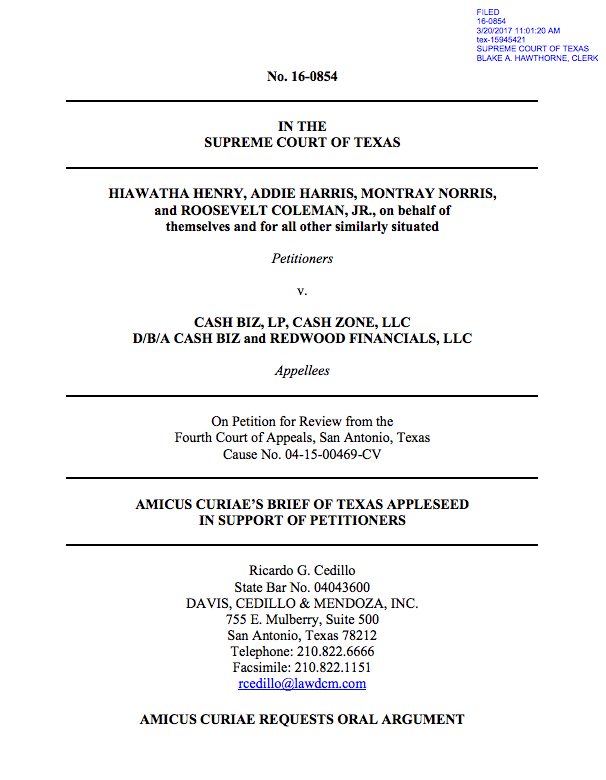Publications
(from the archives) Suspended Childhood: An Analysis of Exclusionary Discipline of Texas' Pre-K and Elementary School Students
April 5, 2017
Originally published in August 2016. Updated with new data, corresponding with a new school year, in April 2017. In schools across the country, very young students are being suspended and expelled at alarming rates. Even children in preschool are being pushed out of their classrooms, usually for minor behaviors that should be addressed through school-based supports and interventions. Unfortunately, Texas public schools are no different in the way they punish very young children. For this updated report, Texas Appleseed analyzed new data (2015-2016 school year) on in-school suspensions, out-of-school suspensions, and placements in disciplinary alternative education programs for Texas children in pre-kindergarten (Pre-K) through 5th grade. This report also highlights updated policy changes from districts in Texas and across the country to reduce classroom removals of very young students.
(from the archives) Defending Against a Civil Asset Forfeiture Case: A Toolkit for Property Owners
March 23, 2017
This toolkit is an introduction to civil asset forfeiture, and it is written specifically for anyone whose property has recently been taken by law enforcement. This toolkit is intended to help you understand which laws allowed your property to be seized, what happens throughout the legal process, and what you can do to try to get your property back. This toolkit is also meant to help anyone who is interested in better understanding civil asset forfeiture, even if it has never happened to you. It may even help you prevent your assets from being forfeited in the future.
(from the archives) In the Supreme Court of Texas: Hiawatha Henry, Addie Harris, et al. v Cash Biz et al.
March 20, 2017
In the Supreme Court of Texas. On Petition for Review from the Fourth Court of Appeals, San Antonio, Texas: Cause No. 04-15-00469-CV. Amicus Curiae’s Brief of Texas Appleseed in Support of Petitioners. Hiawatha Henry, Addie Harris, Montray Norris and Roosevelt Coleman, Jr., on behalf of themselves and for all other similarly situated (Petitioners) v. Cash Biz, LP, Cash Zone, LLC D/B/A Cash Biz and Redwood Financials, LLC (Appellees). Brief Excerpt: Texas Appleseed supports Petitioners before this Court because this dispute illustrates how payday, auto title, and other small-dollar loan arrangers and lenders, like Respondents, exploit the public’s legal system for private, commercial gains to the detriment and harm of all Texans. After using the public’s criminal justice system to help collect private, civil debts from borrowers, these loan arrangers and lenders seek to deprive disadvantaged borrowers of the recourse afforded by public civil courts by compelling costly, individual arbitration, and by preventing these borrowers from banding together to litigate common complaints against them. Such practices enable commercial lenders and loan arrangers to recover private debts using the public resources supported by tax dollars, and then, when the legality of their collection practices is challenged, shield their wrongful conduct from public scrutiny and themselves from liability by demanding that the courts refer the disputes to private, cost-prohibitive arbitrations.
This toolkit – for financial caregivers in Texas who manage money or property for those unable to do so themselves – consists of five guides in English and Spanish at www.ProtectTheirMoneyTx.org. Each of the guides is tailored to the needs of different fiduciary/supporter capacities, including people who are: agents under a power of attorney, appointed by a court to be guardians or conservators, named as trustees under revocable living trusts, appointed by a government agency to manage income benefits, and acting as a supporter under a supported decision-making agreement.
Pages
Criminal Discovery
Fair Defense Act
Immigrant Banking
Immigrant Children & Families
International Remittances
Mental Health
Payday & Auto Title Lending Reform
Protecting Seniors from Financial Abuse
Bail Reform & Pretrial Justice
Civil Asset Forfeiture
Coerced Debt
Debt Collection
Disaster Recovery & Fair Housing
Education Justice
Fair Financial Services
Fines & Fees
Foster Care & Courts
Homeless Youth
Insurance
Juvenile Justice
Other Issues
E-bulletins
Testimony
Handbooks
Amicus briefs
Newsletters
Brochures
Reports















